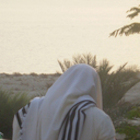
 “All seven days one makes his sukkah permanent and his home temporary.”
“All seven days one makes his sukkah permanent and his home temporary.”
Mishnah Sukkah 2:9
Sukkot is a holiday that is centered on the little structures we build and eat and sleep in for a week every fall. In our tradition, the sukkah is referenced often, but really only in two contexts. The first is physical, referring to the huts we build yearly and for all practical purposes live in. The second is metaphorical, the sukkat shalom/the sukkah of peace that we pray EVERY NIGHT to be spread over us.
And so the sukkah is an amazing structure. It is, by its very nature impermanent. It is real and imagined. It is something that we build ourselves, but can only trust because we believe in its inherent value. Beginning right after Yom Kippur ended, Jews the world over began building their physical sukkot, preparing in a tangible way for the upcoming holiday. The structure is simple, not too tall, three walls, and a roof made of unprocessed natural materials. This roof is perhaps the most striking element. I must use enough material to be a true roof, but it must be porous enough to see stars through it or for rain to drip through. I can not completely protect us from the elements, and can not completely close us off to the world.
Three walls (not four!), no floor, and a (pardon the pun) holy roof. Not much of a home; and yet, we must treat this structure as if it is permanent! So basically, we enter a structure knowing it is flimsy but with a state of mind that says “this is my home, it will protect me.” There is a leap of faith that must be taken to truly experience sitting in a sukkah. So how can it be that this is the structure we describe when describing a divine shelter of peace? This must be wrong. Should it not be a fortress of peace? Wall of peace?
I believe there is deep wisdom in this choice. The shelter of peace needs to have holes, it must be open, it must be somewhat vulnerable. True peace requires just this kind of vulnerability. True peace requires the ability to see beyond what is right in front of us, it requires being able to “see the stars.”